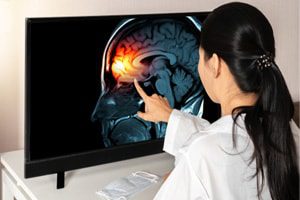
What are Anoxic or Hypoxic Brain Injuries? Anoxic or Hypoxic Brain Injuries are different from traumatic brain injuries (TBIs) because anoxic and hypoxic brain injuries are injuries to the brain caused by a lack of oxygen-rich blood flow to the brain. Anoxic and hypoxic brain injuries are generally connected with strokes. However, strokes are not […]

Brain injury lawsuits
Anoxic or Hypoxic Brain Injuries are different from traumatic brain injuries (TBIs) because anoxic and hypoxic brain injuries are injuries to the brain caused by a lack of oxygen-rich blood flow to the brain. Anoxic and hypoxic brain injuries are generally connected with strokes. However, strokes are not the only reason how this type of brain injury occurs.
One of the first signs of Anoxic and hypoxic brain injuries is the loss of consciousness. The loss of consciousness may last a short period of time or an extended amount of time, depending on the length and severity of oxygen deprivation. When an individual losses consciousness due to a lack of oxygen to the brain, the person could end up in a coma. Another few signs and symptoms of anoxic or hypoxic brain injuries are slurred speech, difficulties with speech, mental confusion, facial drooping, and disorientation.
Complete recovery from severe hypoxic or anoxic brain injury is rare. However, many patients suffering from mild hypoxic or anoxic brain injuries could make a partial or full recovery. Also, these injuries’ effects and symptoms are entirely dependent on which area(s) of the brain was damaged by the lack of oxygen.
There is a Fundamental Legal Difference Between Brain Injuries Caused by Respiratory Events or Primary Cardiac Events
There are many similarities between oxygen-related brain injuries produced by respiratory events and those produced by cardiac events (myocardial infarctions). However, there may be critical differences legally speaking. For example, hospitals have all of the necessary equipment, oxygen, and trained medical staff to prevent a fatal respiratory insufficiency brain injury. No patient should be deprived of life-saving respiratory support to the point that the person sustains a brain injury. The signs of respiratory dysfunction are very obvious as the patient will turn a different color and lack any respiratory patterns.
In hospital settings, the use of blood pressure cuffs and pulse oximetry monitors are routine. A pulse oximeter is placed on the patient’s toe or finger and measures the patient’s level of oxygen in their blood. If the patient’s oxygen level falls below 95% saturation, a loud alarm will sound to alert medical staff of the wearer’s “low oxygen saturation.”
Respiratory Insufficiencies Must Always Be Managed As A Medical Emergency – “Code Blue”
Respiratory insufficiencies are very serious and are always treated as a medical emergency. Nurses and medical staff trained in CPR are permitted to place oxygen on a patient with a low oxygen saturation level or render life-saving mechanical ventilation without a doctor’s order in emergencies. Trained medical professionals may only perform the placement of an emergency endotracheal tube. In severe emergencies when an endotracheal tube cannot be placed, an emergency cricothyroidotomy will be performed by inserting a needle-like device through the cricoid cartilage in the front of the patient’s neck, and a small tube is placed into the hole. This creates and maintains a small opening in the patient’s throat, in which they can breathe.
This is why all brain damage events that occur at a medical clinic or hospital should be investigated to determine why the brain damage occurred. Cardiac and respiratory events do not cause brain damage. The sustained lack of oxygen feeding the brain cells is what causes Anoxic and Hypoxic brain injuries. Often times, the investigation will uncover an inadequate response to signs of Anoxia and Hypoxia. An investigation by medical negligence attorney can help to establish negligence, which is necessary to file a brain injury medical negligence lawsuit.
Medical Malpractice is a major contributing cause of Anoxic and Hypoxic brain injuries. A few examples of the errors and omissions arising from medical malpractice include but are not limited to:
Types of Compensation in Brain Injury Cases
Anoxic and Hypoxic brain injuries always have a devastating and permanent impact on the victims’ quality of life. If you or a member of your family suffered a Hypoxic or Anoxic brain injury, you or your loved one could file a medical negligence lawsuit. By filing a medical negligence lawsuit, you or your loved one could receive compensation for suffering, future medical care, medical expenses, loss of income, loss of future earning capacity, rehabilitation, emotional distress, wrongful death, brain injury-related treatment and medical equipment costs.
If you or a loved one sustained a brain injury, you could be qualified to file a lawsuit to recover monetary compensation for damages.
Parker Waichman LLP helps brain injury victims receive full monetary compensation. Trust your case with our brain injury attorneys. For a free consultation, contact our law firm today by using our live chat or calling 1-800-YOUR-LAWYER (1-800-968-7529).


